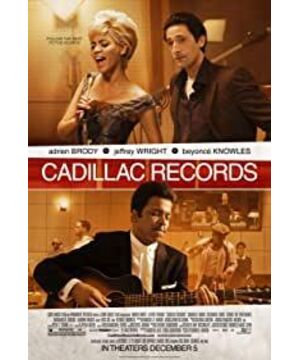This is a film about the history of the famous American blues label Chess Records, and the film closely revolves around the founder of the Chess company, Len Leonard Chess (Leonard Chess) and blues master Muddy Waters (Muddy Waters) two core characters' experiences unfold, and the film is also a review of the history of blues music in the 50s and 60s of the last century in the United States.
In 1950, in Chicago, Leonard Chase, a young Jewish immigrant who started his business by running a club (in reality, the two Chase brothers) found a business opportunity to switch to the record industry and established the Chase Records Company. As the most outstanding blues music label in the history of American music, the artists who have worked with Chase Records include: Muddy Waters, Little Walter, Chuck Berry, Etta James and a group of music masters inducted into the Rock and Roll Hall of Fame. The influence and development of blues music, rock music, and even pop music have all played a role that cannot be ignored. From buskers to masters, Chase Records is a breeding ground for blues musicians.
The film did not deliberately praise Leonard Chase and make a name for himself, nor did it exaggerate the huge impact on the American society at the time when rock music was born, but from an objective and calm perspective The complex and contradictory character relationships among the company's artists are heavily inked. The literal translation of the film's title is "Cadillac Records", which is obviously a direct expression of the nature of Chase's business operations and Leonard's businessman status. In the film, Leonard buys a Cadillac for every successful artist in the company. Leonard, who was generous on the surface, took advantage of the trust of the artists and the weakness of lack of culture to deduct the copyright fees of the artists, and even the company veteran (the first artist signed) has been following him Moody Waters is no exception. . In addition, Leonard's true and false love for R&B singer Etta James (played by Beyonce) was originally motivated by an emotional investment. collaborator? family? friend? relatives? Appreciate and be appreciated? Investing and being invested? Use and be used? Possibly all that. But what is certain is that Leonard is not only an excellent businessman, but also a musician with a considerable musical appreciation. He was keenly aware of the potential of the black music market, and successfully turned these black farmers from Mississippi cotton plantations into shining music stars. To paraphrase a sentence: in the music circle, he understands business best, and in the business circle he understands music the most.
Like the blues harmonica player Little Walter (who died in a street fight) in the film, the fate of many blues artists is tragic. Once they have money, they will spend it all on spirits, drugs and women, or die early due to accidents or illnesses, it seems to have become their tradition. They came to Chicago from the far south, of course not for some lofty musical ideals, they just didn't want to sweat in the cotton fields in the countryside, because they had a talent for playing the blues, and came here to eat. I heard that if you sing a few songs to a "small square box", you can earn several dollars. For these "lazy guys", this is definitely a good job. (Funded by the U.S. Library of Congress at the time, many folk song collectors went into the fields of the southern United States to collect music and record audio materials.) And Leonard gave them far more than that. Music made them rich and brought Corrupted life, in a sense, tragedy seems to be doomed.
In order to be more suitable for performing in big city clubs, blues artists developed urban blues music on the basis of country blues music (representative - Moody Waters), which is actually a performance of pleasing and entertaining white people. Bolder sexual innuendo began to appear. It's all about money, it doesn't matter how the music is played, it's the last word that the record sells well. After all, the market for black compatriots is limited, and only by impressing white people can they make more money. When Chuck Berry danced the duck cloth, played the standard twelve-bar blues, and shouted "Go, Go, Jonny Go", the white youths followed along, twisting their butts and screaming with excitement , When mad, it is not difficult to understand why there are always Cadillacs parked in front of the Chess record company.
So this movie isn't about the ideals, struggles, successes of musicians, it's about stark reality.
In 2002, the US Congress passed a bill to designate 2003 as the year of the blues. Blues music has gone through a hundred years of history, and now it has disappeared, and the constantly developing modern pop music has hardly found the shadow of blues. At the end of the film, Moody Waters, who has almost no market in the United States, was invited to the United Kingdom. He did not know that the second revival of blues music in the history of music had arrived. Maybe a hint, maybe a good wish, and who's to say the blues won't make a comeback again? (Wen\Berunika 090415) I
like it because of sadness, I like it because of joy, I
like it because of loneliness, I like it because of happiness, I
like it because of pain, I like it because of stubbornness, I
like it because of freedom, I like it because of love, I
like it because of death, I like it because of...
View more about Cadillac Records reviews











